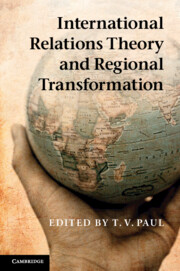Book contents
- Frontmatter
- Contents
- Figures and tables
- About the contributors
- Acknowledgments
- Part 1 Introduction
- Part 2 Realist perspectives
- Part 3 Liberal perspectives
- Part 4 Constructivist perspectives
- 8 Ideas, norms, and regional orders
- 9 Regional security practices and Russian–Atlantic relations
- Part 5 Eclectic perspectives
- Part 6 Conclusions
- Index
- References
8 - Ideas, norms, and regional orders
Published online by Cambridge University Press: 05 June 2012
- Frontmatter
- Contents
- Figures and tables
- About the contributors
- Acknowledgments
- Part 1 Introduction
- Part 2 Realist perspectives
- Part 3 Liberal perspectives
- Part 4 Constructivist perspectives
- 8 Ideas, norms, and regional orders
- 9 Regional security practices and Russian–Atlantic relations
- Part 5 Eclectic perspectives
- Part 6 Conclusions
- Index
- References
Summary
In this chapter I focus on two questions that are central to a social constructivist understanding of regional orders. The first is whether and how “ideas make regions.” The second is how to conceptualize the diffusion of ideas and norms (used interchangeably here, mindful that ideas do not necessarily make behavioral claims as norms do) across the regional–global divide, that is, between regions and the global system at large, a process that is crucial to the creation and maintenance of regional orders. Until recently, international relations scholars paid scant attention to these questions. The advent of constructivism as a distinct perspective on international relations has changed that. I will argue, however, that constructivism, despite its claims to be an “ideas first” (as opposed to “ideas only”) theory, is yet to fully address these two questions. Constructivism’s position on the relationship between ideas and power remains ambiguous at best. And constructivism is especially weak when it comes to exploring the global–regional nexus in the diffusion of ideas and norms, focusing almost exclusively on how universal norms trump local or regional ones.
How do ideas make regional orders? Regions as imagined communities
At the outset an important question needs addressing. What does it take to be an “ideational” view of regions and regional orders? In international relations theories, the use of “ideational” has exploded with the growing popularity of constructivism. But “ideational” can mean a whole range of things, such as values, principles, ideology, culture, and identity, among others. In writings on regions, especially when it comes to defining regionness, it is not uncommon to find references to such variables as sociocultural similarity, shared values, and a common identity. And the inclusion of these elements in the literature on regions long predates constructivism.
- Type
- Chapter
- Information
- International Relations Theory and Regional Transformation , pp. 183 - 209Publisher: Cambridge University PressPrint publication year: 2012
References
- 14
- Cited by



